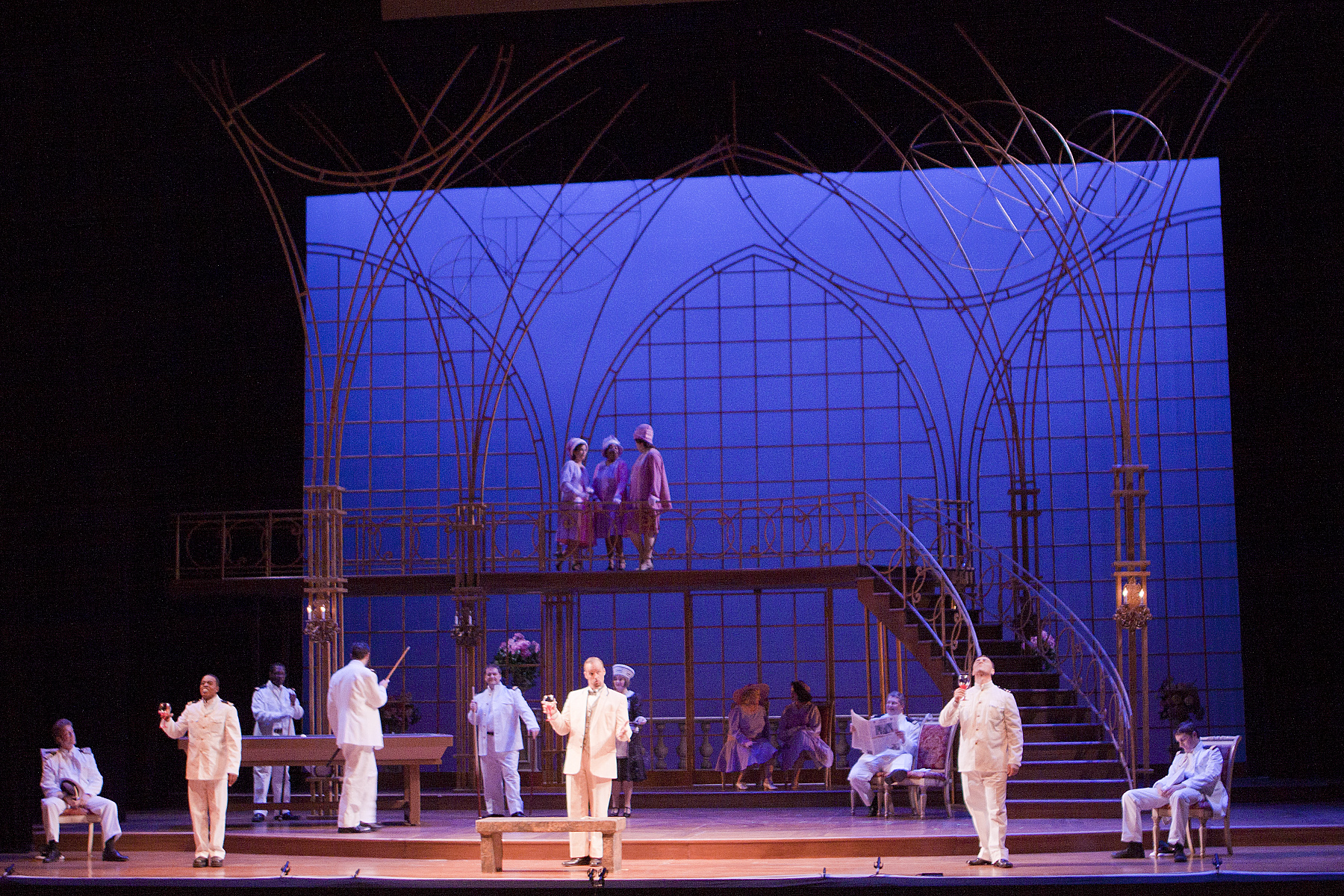The plot for Mozart’s Così fan tutte could easily be mistaken for that of an ’80s sitcom. The maestro and librettist Lorenzo Da Ponte used dramatic material (jealous boyfriends, philandering girlfriends, cheating, flirting) that is as relatable and humorous today as it was more than two centuries ago. Fortunately for Fort Worth audiences, the connections between this 18th-century opera buffa and cheesy TV stop there. Fort Worth Opera’s production of Così, one of four operas in the company’s 2014 festival, combines richly re-imagined set and costume designs, powerful vocal performances, and the enchanting musical language of Mozart (under the skillful baton of Garrett Keast) to create an experience that is both fresh and vibrant while remaining true to the great composer’s original vision.
Written near the end of Mozart’s life, Così follows the exploits of two soldiers and friends, Ferrando (tenor Scott Quinn) and Guglielmo (baritone Paul Scholten), who are dared to test the love of their girlfriends, Fiordiligi (soprano Jan Cornelius) and Dorabella (mezzo-soprano Kathryn Leemhuis), who are sisters, by an old friend, Don Alfonso (baritone Tyler Simpson). The buddies accept the challenge, disguise themselves as foreigners, and proceed to court their unwitting lovers to test the women’s fidelity.
FWO’s most significant touch is the changing of the setting from 18th-century Naples to the roaring ’20s. The entire production was backdropped by golden scaffolding forming gothic-inspired patterns in soft blue light. The first act opened with Ferrando, Guglielmo, and Don Alfonso seated near a billiard table. As Ferrando boasted of the fun he was going to have serenading Dorabella in disguise, he grabbed a cue stick and sang into one end a la vintage Elvis. (Director David Gately peppered the entire opera with multiple delightful and humorous accents.) Simpson’s rich and dark-hued voice added gravitas to Don Alfonso, who is effectively a puppet master, dangling the unwitting lovers to and fro. Equally powerful was Simpson’s theatrical performance: outwardly charming and boastful, he also offered subtle smirks and all-knowing glares that revealed his true intentions but only to the audience.
The second act introduced Dorabella and Fiordiligi, sitting in a garden, doting over portraits of their boyfriends. The opening aria “Ah, guarda sorella” displayed Cornelius’ and Leemhuis’ superlative skills as they rendered the soaring ornamented lines with poise and brilliance. As part of his ploy, Don Alfonso arrived to tell the sisters that their lovers were leaving to go to war. Ferrando and Guglielmo appeared to say farewell, and a confused looking military officer (hired by Don Alfonso) entered to announce their eminent departure. The scene reached farcical levels when Ferrando and Guglielmo saluted the officer, who only stared back in confusion. A not-so-subtle gesture by Don Alfonso reminded the officer that the two were saluting him, and he abruptly returned the formality. The entire scene was a ruse, though, and the two soldiers returned in disguise to court their unwitting lovers.
Surprisingly, the sisters did not recognize them and immediately rebuffed their advances. After Dorabella and Fiordiligi left, Ferrando was so moved that he sang one of the most beautiful arias of the opera, “Un’aura amorosa.” Quinn’s rendering of the song was drenched in a lyrical fervor and angst that could come only from a man drunk with love.
One delightful surprise, and comedic foil throughout the opera, was the role of Despina (soprano Kerriann Otano), the sister’s maid. Early in the first act, Despina was hired by Don Alfonso to convince Dorabella and Fiordiligi to cheat on their lovers. Otano showed off her naturally warm, velvety voice with her aria, “In uomini, in soldati,” but later she showcased her penchant for different timbres in the role of a shrill, nasally voiced doctor at the end of act one. Desperate to test the fidelity of their lovers, Ferrando and Guglielmo pretended to take arsenic, pleading for one last kiss. The ploy failed again, and Don Alfonso motioned for a doctor (Despina) to revive the two men.
By the end of the second act, Dorabella and Fiordiligi slowly succumbed to the advances of their disguised lovers, only to find out they’ve been duped all along. Don Alfonso, relishing in the moment, tried to calm the women by telling them that he was only teaching Ferrando and Guglielmo a lesson about the complexities of love.
Few operas draw as much scrutiny and criticism as Mozart’s, to say nothing of the mythical collaborations between him and Da Ponte. Given the strength of the FWO cast’s performances and the great detail given to this rendition of Così fan tutte, audiences will be free to set aside their preconceptions and enjoy this unabashedly honest story of misguided love.
Fort Worth Opera’s Così fan tutte
2pm Sun at Bass Performance Hall, 525 Commerce St, FW. $87. 817-731-0726.













Much better stoned.